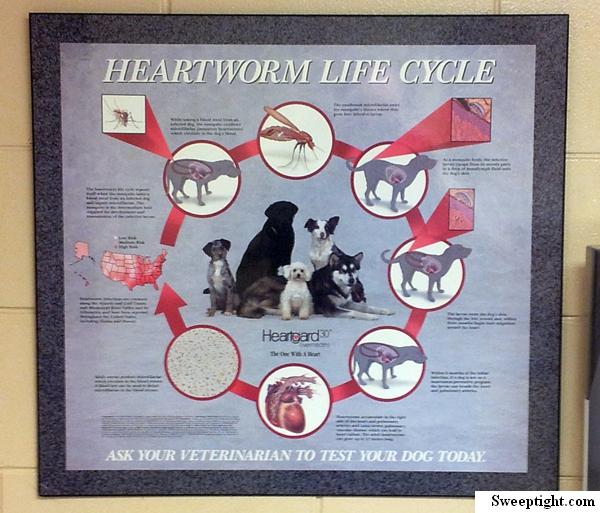Veterinary Care and the Importance of Heartworm Testing
Veterinary care is an important part of keeping pets healthy. I work for a veterinarian, and in our practice we constantly stress the importance of heartworm testing and heartworm prevention for dogs and cats.
Follow Veterinary Advice for Your Pet’s Health
The process of treating a pet – most commonly dogs – for heartworm disease is intensely painful, and in some cases, deadly. The tragic truth is that even though heartworm infection and treatment can be fatal and are most certainly painful, many owners disregard veterinary advice and decline heartworm testing.
What are Heartworms?
Although commonly referred to as heartworm disease, this horrible condition is actually an infestation of deadly parasitic worms which live in the hearts and lungs of infected animals, gathering nutrients from the animal’s blood. These spaghetti-like worms can grow up to twelve inches long and live for five to seven years.
Heartworm Life Cycle

Heartworm disease is transmitted via mosquitos. Mature heartworms living in an infected animal release microfilariae into the animal’s blood. When a mosquito feeds on an infected animal, it sucks up the microfilariae contained in the host’s blood. Once inside the mosquito, the microfilariae develop into larvae, which are then transmitted to a new host when the mosquito takes its next blood meal.
Once inside the new host, the larvae travel through the animal’s tissues to the heart where they mature into adult heartworms, a process which takes approximately seven months. After maturity, the heartworms clog the heart valves, feeding on the host’s blood and releasing more microfilariae. The cycle then repeats itself. This infinitive reproductive process is why veterinary practices push so hard for heartworm testing and preventative.
Symptoms of Heartworm Infection
Heartworm infection causes serious systemic complications which do not present until the disease is in its advanced stages. Symptoms are varied and equally broad, but the most obvious are those that pertain to congestive heart failure.
An animal with heartworms most commonly presents with:
- Lethargy
- Coughing
- Labored breathing
- Weakness
- Syncope (temporary loss of consciousness)
- Abnormal heart and lung sounds
- Ascites (fluid accumulation in the abdominal cavity)
Heartworm Treatment
Veterinary treatment for heartworm infestation requires the use of an arsenic-based drug called Immiticide. The medicine is most commonly administered in a three-dose protocol to ensure the gradual death of the heartworms. If the worms are killed too quickly, they will clog the animal’s heart valves causing heart failure.
Using the three-dose protocol, an initial dose of Immiticide is administered deep into the muscle of the lower back. This is an extremely painful medicine requiring an equally painful delivery method. Severe injection site pain is common, and pain medication is often required. In many cases, the injection site may abscess. Abscesses require additional care to prevent infection. One month after the initial dose, the pet receives two more doses, spaced twenty-four hours apart.
In addition to the agony and danger inherent in the treatment, the pet must suffer through severe confinement and movement restriction. When heartworms are killed they are not passed out of the digestive tract as are intestinal parasites. Heartworms must decompose inside the heart and blood vessels until their remains can be absorbed through the vessel walls and passed through the liver and kidneys. During this time, total restriction of movement is necessary to reduce rapid blood circulation which could result in dead heartworms clogging the heart valves or arteries. Anyone with an animal knows that this sort of confinement is horrible for a pet.
Heartworm Prevention and Protection
An ounce of prevention is worth a pound of cure. It is a saying we are all familiar with. In this case, a few dollars worth of prevention is worth hundreds of dollars of cure. Heartworm testing requires a very simple blood test that your veterinary clinic runs in-house. It only takes thirty minutes to determine if a dog or cat has the disease.
Heartworm preventative is highly effective, but no medicine or treatment is guaranteed to be one hundred percent effective. That is why yearly heartworm testing is so important. Assuming the pet is negative for heartworms, all it takes to prevent this horrible, life-threatening disease is a small treat containing a de-worming agent. The owner’s veterinary practice will recommend the appropriate type of preventative as well as the correct dosage.
Ideally, dogs and cats should be on heartworm preventative year round, beginning at six months of age. They will remain protected against heartworms as well as several other parasitic worms, some of which can also be transmitted to humans.
Heartworm testing is a simple procedure that saves pets’ lives. It is inexpensive and one of the easiest things an owner can do to help keep their pet healthy. I strongly urge all pet owners reading this article to have their veterinary practitioner test their pets for heartworm regularly.
Ben Butler, President and CEO of bizzybim.com, is a professional writer, copywriter, VA, and editor with over five years experience. His clients range from mom-and-pop internet stores in England to multi-million dollar companies in the United States.







My wife and I got a rescue 2 years ago and she had heart worms. The before and after energy levels and overall happiness was a noticeable difference. We hated having to keep her calm for months on end.
It is SO easy to prevent it disgusts me that people can’t take the time to do so.
Last i heard, Immiticide wasn’t being distributed in the US (FDA?) so it is of the upmost importance that dogs be kept on heartworm prevention.
Did you know that people can get heartworms? It is very rare since we the don not lime us as hosts.
I believe they’ve started to distribute Immiticide again. I’ll have to double check with my boss; but even if it is, it’s such a horrible treatment on its own that people should just fork out the $45.00 and get it done.
I didn’t realize just HOW bad it is. Thankfully I’ve always had my pets taken care of by vets and have not had to seen this problem yet, but very important information!
We are currently thinking about getting a dog so this is great information to have. I didn’t know much about heart worms, but I will make sure I remember this when we get a dog! Thanks!
It’s ashame that people let this happen to their pets. Our neighbor’s dog died of heart worms last year. I was so upset about it. When you make the decision to care for a dog you should take it to the vet. Thanks for sharing this.
Our dog gets a yearly visit to the vet, but I didn’t realize how bad heartworms can be. I am going to share this with my husband so we can both help prevent this from happening to our golden!
Our dogs go yearly to the vet, and we give them heartworm meds year round. I want them to live as long as possible!
That hear looks disgusting! We just rescued a dog the end of December – he is about due for his rabies so will be talking to the vet then about meds. We just started taking him to the dog park so the meds would be a good thing!